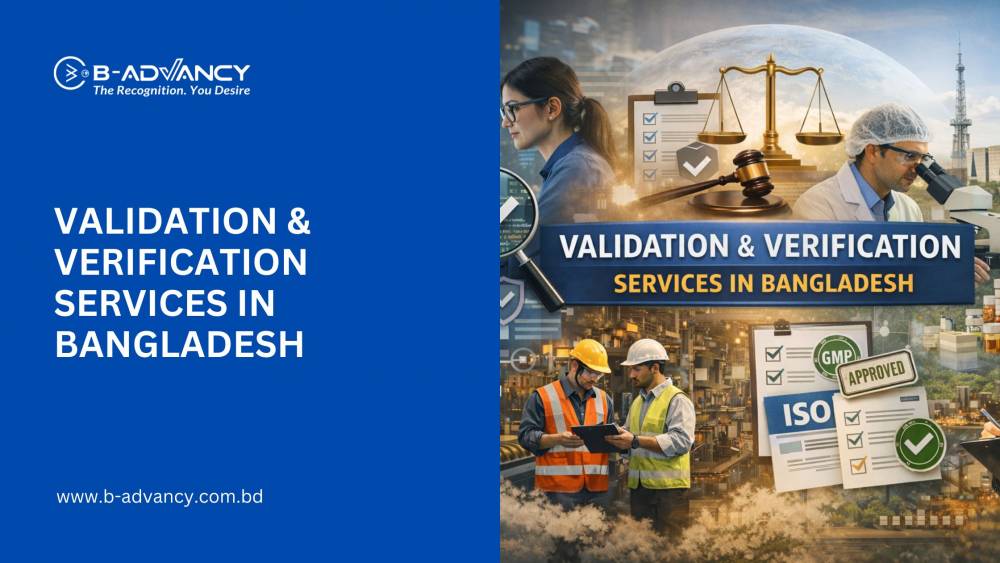The marine and offshore industry is vital to Bangladesh's economy, playing a key role in trade, transportation, and resource extraction. As global standards and environmental regulations become stricter, companies in this sector must adhere to internationally recognized standards to remain competitive. ISO certification for the marine and offshore industry ensures compliance with safety, environmental, and quality management protocols. This blog explores the importance of ISO certification in this industry, the benefits it offers, relevant rules and regulations, and how to begin the certification process with B-ADVANCY Certification Limited.
What is ISO Certification and Why is it Important for the Marine and Offshore Industry?
ISO certification refers to a series of internationally recognized standards that guide companies in maintaining operational efficiency, safety, and environmental compliance. For the marine and offshore industry, these standards focus on risk management, quality control, and minimizing environmental impact. In an industry prone to high risks and complex regulations, ISO certification provides a structured framework to ensure safe operations and sustainable growth.
Bangladesh’s marine and offshore sector is crucial for its economic development, particularly in shipbuilding, oil and gas extraction, and port operations. ISO standards help these industries mitigate risks such as accidents, environmental hazards, and inefficient processes. They also ensure compliance with international trade requirements, enabling Bangladeshi companies to compete globally.
Key ISO Standards for the Marine and Offshore Industry
Several ISO standards are particularly relevant for the marine and offshore sectors:
-
ISO 9001: Quality Management Systems
ISO 9001 sets the criteria for quality management systems (QMS) across industries. For the marine industry, it helps improve operational processes, ensuring products and services consistently meet customer expectations while complying with applicable regulations. -
ISO 14001: Environmental Management Systems
ISO 14001 focuses on minimizing environmental impact by encouraging sustainable practices. This is crucial for marine operations, where environmental risks, such as pollution from ships and offshore rigs, are high. -
ISO 45001: Occupational Health and Safety Management Systems
Health and safety are paramount in the marine and offshore sectors, where employees work in hazardous conditions. ISO 45001 ensures that companies implement robust safety protocols, reducing the risk of accidents and ensuring worker well-being. -
ISO 50001: Energy Management Systems
With energy efficiency becoming a key concern, ISO 50001 helps marine companies optimize their energy use, reducing costs and lowering greenhouse gas emissions. -
ISO 30000: Ship Recycling Management Systems
This standard is vital for ensuring the safe and environmentally sound recycling of ships, a significant aspect of Bangladesh’s marine industry.
Benefits of ISO Certification for the Marine and Offshore Industry in Bangladesh
-
Improved Safety and Risk Management
By adhering to ISO standards such as ISO 45001, companies can reduce the risk of accidents and enhance safety for their workers, leading to fewer operational disruptions. -
Environmental Compliance
ISO 14001 and ISO 50001 certifications ensure that marine and offshore operations comply with international environmental regulations, helping reduce pollution and conserve energy. -
Enhanced Quality Control
ISO 9001 certification improves the quality of services and products, increasing customer satisfaction and fostering long-term business relationships. -
Global Competitiveness
ISO certification demonstrates a company’s commitment to international standards, making it easier to compete in global markets and meet the requirements of international clients. -
Regulatory Compliance
Many international regulations governing marine and offshore industries, such as those related to safety, pollution, and waste management, align with ISO standards. Achieving ISO certification ensures compliance with these regulations, reducing the risk of fines and operational delays.
Bangladesh Rules and Regulations Regarding ISO Certification
In Bangladesh, the marine and offshore sectors are regulated by both international and national laws. The Bangladesh Standards and Testing Institution (BSTI) is the national body responsible for implementing and promoting international standards, including ISO. For the marine industry, BSTI works in collaboration with the Bangladesh Marine Academy, the Department of Shipping, and the Bangladesh Inland Water Transport Authority (BIWTA) to ensure compliance with ISO standards.
Additionally, the International Maritime Organization (IMO) sets safety and environmental standards for global maritime operations. These are enforced in Bangladesh through the Department of Shipping and other relevant authorities, ensuring that companies comply with international protocols.
For further details, visit:
-
Department of Shipping
Steps to Achieve ISO Certification for Your Marine and Offshore Business
-
Initial Assessment and Gap Analysis
Start by conducting an internal audit to assess your current practices against relevant ISO standards. Identify areas where your operations fall short and need improvement. -
Develop and Implement Management Systems
Based on the gap analysis, develop the required management systems (e.g., QMS, EMS, or OHSMS). Ensure that all processes, documentation, and staff training align with ISO standards. -
Internal Audit and Management Review
Conduct regular internal audits to evaluate the effectiveness of your management systems. Involve senior management in reviewing these systems to ensure ongoing compliance and continuous improvement. -
Select a Certification Body
Choose a reputable certification body like B-ADVANCY Certification Limited to conduct the external audit. Prepare thoroughly for this audit by ensuring all your processes and documentation are in order. -
Achieve Certification and Maintain Compliance
After a successful audit, you will receive ISO certification. Continuous monitoring and periodic audits are essential to maintaining your certification and reaping the long-term benefits of ISO compliance.
Challenges in Implementing ISO Certification
-
Cost and Resource Allocation
Implementing ISO standards requires financial investment and resource allocation, particularly for smaller marine companies. However, the long-term benefits in terms of safety, efficiency, and market competitiveness outweigh the initial costs. -
Resistance to Change
Shifting from traditional operational practices to ISO-certified processes may face resistance from employees and stakeholders. Effective communication and training programs can help overcome this hurdle. -
Complexity of Marine Operations
The marine and offshore industry is complex, involving multiple stakeholders and processes. Implementing ISO standards across these diverse operations can be challenging, but a well-structured management system can simplify the process.
B-ADVANCY Certification Limited offers expert guidance to help businesses in the marine and offshore sectors navigate the complexities of ISO certification, ensuring a smooth transition to internationally recognized standards. Contact them at:
Email: bangladesh@b-advancy.com
Call: +8801612264559
Conclusion
ISO certification is an essential step for marine and offshore companies in Bangladesh looking to improve safety, operational efficiency, and environmental responsibility. It not only enhances business reputation but also ensures compliance with international regulations, helping companies stay competitive in a rapidly evolving industry. While implementing ISO standards presents challenges, the long-term benefits of certification—improved safety, sustainability, and marketability—make it a strategic investment for businesses in this sector.


25.jpg)



































































































































































































